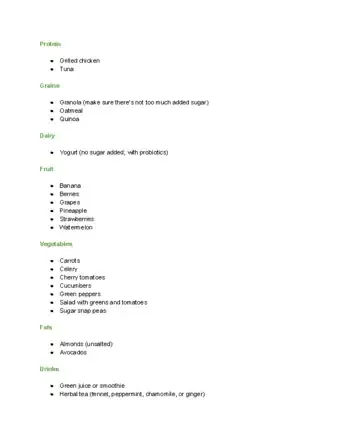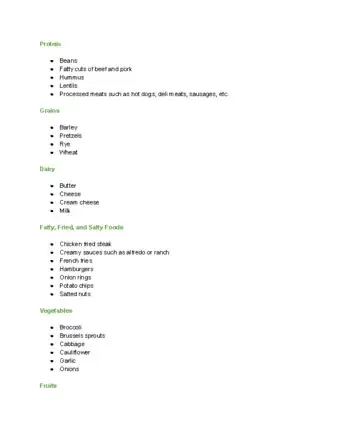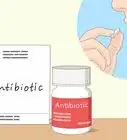This article was co-authored by Amy Tan. Amy Tan is a Travel Planner and the Founder of Planet Hoppers, a boutique travel design team founded in 2002. Planet Hoppers specializes in brainstorming and creating itineraries for dream vacations, honeymoons, exotic adventures, family reunions, and group trips. Planet Hoppers is a TRUE accredited travel agency and a member of the Signature Travel Network, the Cruise Lines International Association (CLIA), and Travel Leaders. Amy earned a BA in Communications and a BS in Physics from the University of California, Davis in 2000.
There are 17 references cited in this article, which can be found at the bottom of the page.
This article has been viewed 138,273 times.
It's very common to have an upset stomach on an airplane. Maybe your stomach is upset from motion sickness, the flu, or anxiety. There are some quick ways you can feel better and prevent air sickness in the first place.
Steps
Relieving an Upset Stomach in the Air
-
1Use a quick trick to reduce upset stomach. Are you close to throwing up in the air? There are some small measures you can take that might help you feel better fast.
- Put pressure on the inside of your wrist. Press down, gently but firmly, with your fingers about two fingertip widths above your hand’s bottom.[1]
- Suck on hard candy to keep your saliva going. This will help reduce the feeling of a sick stomach in many cases.
- Ask for lemons. They will settle an upset stomach. The flight attendants might have some on their beverage trolley. Suck on the lemon wedges.
-
2Ask for an aisle seat. It’s easier to rush to the bathroom if you’re sitting next to the aisle. If you’re a queasy flyer, request one!
- To reduce motion sickness, focus your eyes on a distant fixed point. Keep your mind occupied. Do a Crossword puzzle or play a game on your computer.
- Take a long, deep breath through your nose, and then slowly breathe out. Take advantage of times that the seatbelt sign goes off, and take a bathroom break. This might help relieve some of your stomach stress.
- Ask to sit near the plane’s wing, where it’s most stable or back by the bathroom so you're close. Be aware that the back of a plane is the bumpiest, usually. You're more likely to get sick to your stomach in the back.[2]
Advertisement -
3Shift position. Don’t stay crouched in the same position. Give your body some relief by moving as much as you can!
- You will want to stretch somehow, either by walking to the bathroom or while sitting in your seat.
- Massaging the abdomen can also lower pain from gas. Do this gently.
- Try to shift position in your seat every half hour if you can’t get up. You can do this by crossing your legs, leaning forward, or putting your feet on your carry-on bag.
-
4Turn on the ventilation nozzle. This is the small nozzle you can turn on above you to direct air towards your face.
- The gush of fresher air might make you feel somewhat better. Move your seat back and recline if you are allowed to do so.
- Look at the sky out the window, if you have a window seat, with your head slightly tilted back. Focus on the horizon.[3] If your upset stomach is caused by anxiety, try to calm down by listening to calming music or by sleeping.
- Try to stay warm by requesting a blanket to at least cover your legs. Reading can increase motion sickness.[4]
-
5Use an air sickness bag. They are there for a reason! Even if you’re not sure you’re going to throw up, it’s a good idea to have one ready.
- You can usually find air sickness bags in the back of the chair in front of you. You might want to hold two of them near you.
- If you can’t find one, ask the flight attendant. Letting the flight attendant know you’re feeling sick can also be a good idea in general. They may let you move to a seat closer to the toilet.[5]
- Don’t feel embarrassed. Studies have shown that people have more flatulence and also bloating while flying, and that doesn’t account for the fact that some people just get nervous in the air, making it worse.[6]
Preventing An Upset Stomach Before Flying
-
1Drink a lot of water. You want to avoid carbonated drinks like sodas because they can cause bloating and cramping. Instead, stay hydrated by regularly drinking water.
- In addition, carbonated drinks have a diuretic effect. Instead, drink water. It will also help if your stomach is upset on the flight. Take regular sips of the water, rather than downing it all at once.
- Drink water 24 to 48 hours before your trip too at regular intervals.[7]
- It’s a good idea to drink at least 8 ounces of water for each hour that you’re in the air. Take a water bottle on the plane; there’s no ban on it, generally.[8]
-
2Avoid alcohol and caffeine. Drinking either one of these before you fly or during the flight could make you feel sicker.
- Alcohol could lead to a sick stomach. It can also make it harder to fall asleep after you wake up.
- Instead, in addition to water, choose beverages that have a lot of electrolytes, such as those in tomato or fruit juice. Other beverages can also help hydrate you.
- In addition, try not to drink alcohol the night before you fly. Having a hangover is going to make an upset stomach much more likely.
-
3Take supplements. There are many different supplements that can help ease or prevent an upset stomach.
- Use magnesium to destress. This is a muscle relaxant, and some people add it to herbal tea.[9] Other sources of magnesium include organic cereal and cacao nibs. Digestive enzymes can also help you on board.
- Try ginger. Take a ginger pill, suck on ginger candy or ask for a ginger ale. This is said to help some people with motion sickness, although watch drinking too many carbonated beverages.
- Natural remedies for motion sickness include ginger, peppermint, fennel, basil, and Fenugreek.[10]
Eating the Right Foods
-
1Avoid certain foods before you fly. It’s easier to reduce the chances you will get a sick stomach on an airplane in the first place.
- Airports don’t have a lot of great food options, but downing a fast-food meal before flying is a recipe for an upset stomach on board.[11]
- Better choices are natural foods, like carrots and nuts. It’s harder to digest foods full of salt and saturated fat while flying. Avoid eating food that causes gas and bloating, such as fried foods, but also avoid foods like baked beans, cauliflower, and onions.
- Avoid anything you have an intolerance for; for example, if you’re lactose intolerant, avoid dairy.[12]
-
2Do eat something. If you fly on an empty stomach, you might feel sick to it. Try to eat something but make it something bland.[13]
- Snack on pretzels. Bring some along, although most airlines offer them while you’re on board. If you're feeling sick, ask the flight attendant for some crackers.[14]
- Strive to eat foods that are higher in protein, such as a peanut butter sandwich, meat, or fish. These will fill your stomach and settle it.
- If you didn’t bring any food along, don’t reject the airline meal completely. Nibble on fruit or crackers, at least.
-
3Bring medicine. Just in case, bring along some Pepto Bismol when you fly. That way, if your stomach is feeling sick, you’ll be prepared.
- Remember that Pepto Bismol comes in chewable form, which is obviously a better choice on a plane than a liquid bottle. You could also purchase motion sickness bands. These bands work because they have a small knob on the inside that applies constant pressure to reduce nausea.
- Take an over the counter medicine like Gas-X or other Anti-Gas pills if you’re worried you’re going to get a sick stomach in the air. It’s not recommended to fly if you’ve recently had stomach surgery.[15]
- Be aware if you have chronic intestinal inflammation that some studies have found that travel can lead to bouts of it, partly due to the lack of oxygen in an airplane.[16]
Lists of Foods to Eat and Avoid
Expert Q&A
Did you know you can get expert answers for this article?
Unlock expert answers by supporting wikiHow
-
QuestionWhat should I do after I get sick on a plane?
 Amy TanAmy Tan is a Travel Planner and the Founder of Planet Hoppers, a boutique travel design team founded in 2002. Planet Hoppers specializes in brainstorming and creating itineraries for dream vacations, honeymoons, exotic adventures, family reunions, and group trips. Planet Hoppers is a TRUE accredited travel agency and a member of the Signature Travel Network, the Cruise Lines International Association (CLIA), and Travel Leaders. Amy earned a BA in Communications and a BS in Physics from the University of California, Davis in 2000.
Amy TanAmy Tan is a Travel Planner and the Founder of Planet Hoppers, a boutique travel design team founded in 2002. Planet Hoppers specializes in brainstorming and creating itineraries for dream vacations, honeymoons, exotic adventures, family reunions, and group trips. Planet Hoppers is a TRUE accredited travel agency and a member of the Signature Travel Network, the Cruise Lines International Association (CLIA), and Travel Leaders. Amy earned a BA in Communications and a BS in Physics from the University of California, Davis in 2000.
Travel Planner & Founder, Planet Hoppers
References
- ↑ http://traveltips.usatoday.com/prevent-motion-sickness-air-travel-1580.html
- ↑ https://health.clevelandclinic.org/2015/04/motion-sickness-best-fixes-if-traveling-makes-you-ill/
- ↑ http://www.mayoclinic.org/first-aid/first-aid-motion-sickness/basics/ART-20056697
- ↑ http://www.medicinenet.com/tips_to_prevent_motion_sickness/views.htm
- ↑ http://travel.stackexchange.com/questions/13342/how-to-vomit-during-a-flight
- ↑ http://www.bbc.com/future/story/20141218-why-do-we-fart-more-on-planes
- ↑ http://www.motion-sickness-guru.com/basic-dos-and-donts.html
- ↑ http://www.motion-sickness-guru.com/air-sickness.html
- ↑ http://www.prevention.com/food/healthy-eating-tips/nutrition-advice-getting-sick-while-traveling
- ↑ http://www.motion-sickness-guru.com/natural-herbal-and-homeopathic-motion-sickness-remedies.html
- ↑ http://abcnews.go.com/Travel/foods-avoid-flying-upset-stomach/story?id=11759056
- ↑ https://www.mayoclinic.org/diseases-conditions/lactose-intolerance/diagnosis-treatment/drc-20374238
- ↑ http://roadwarriorette.boardingarea.com/2012/01/13/flying-with-an-upset-stomach/
- ↑ http://www.mayoclinic.org/health-tip/ART-20049280
- ↑ http://maphappy.org/2014/09/sick-or-injured-what-you-need-to-know-before-flying/
- ↑ https://www.sciencedaily.com/releases/2013/09/130916090838.htm
- ↑ Amy Tan. Travel Planner & Founder, Planet Hoppers. Expert Interview. 12 March 2020.









































































Medical Disclaimer
The content of this article is not intended to be a substitute for professional medical advice, examination, diagnosis, or treatment. You should always contact your doctor or other qualified healthcare professional before starting, changing, or stopping any kind of health treatment.
Read More...